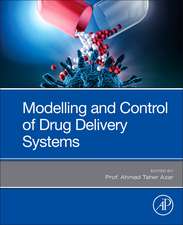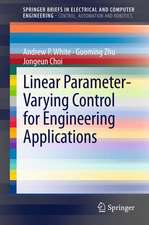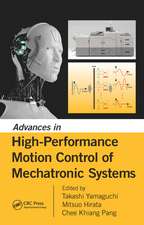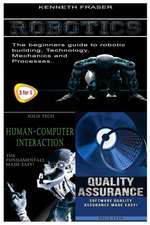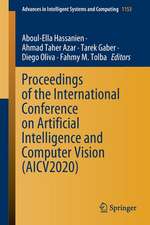Mobile Robot: Motion Control and Path Planning: Studies in Computational Intelligence, cartea 1090
Editat de Ahmad Taher Azar, Ibraheem Kasim Ibraheem, Amjad Jaleel Humaidien Limba Engleză Hardback – iul 2023
Nonetheless, modern robotic applications, particularly those requiring one or more robots to operate in a dynamic environment (e.g., human–robot collaboration and physical interaction, surveillance, or exploration of unknown spaces with mobile agents, etc.), pose new and exciting challenges to researchers and practitioners.
For instance, planning a robot's motion in a dynamic environment necessitates the real-time and online execution of difficult computational operations. The development of efficient solutions for such real-time computations, which could be offered by specially designed computational architectures, optimized algorithms, and other unique contributions, is thus a critical step in the advancement of present and future-oriented robotics.
Din seria Studies in Computational Intelligence
- 20%
 Preț: 449.37 lei
Preț: 449.37 lei - 20%
 Preț: 1158.26 lei
Preț: 1158.26 lei - 20%
 Preț: 986.66 lei
Preț: 986.66 lei - 20%
 Preț: 1452.76 lei
Preț: 1452.76 lei - 20%
 Preț: 168.78 lei
Preț: 168.78 lei - 18%
 Preț: 1112.30 lei
Preț: 1112.30 lei - 20%
 Preț: 565.38 lei
Preț: 565.38 lei - 20%
 Preț: 649.28 lei
Preț: 649.28 lei - 20%
 Preț: 1047.73 lei
Preț: 1047.73 lei - 20%
 Preț: 1578.96 lei
Preț: 1578.96 lei - 20%
 Preț: 643.50 lei
Preț: 643.50 lei - 20%
 Preț: 657.49 lei
Preț: 657.49 lei - 20%
 Preț: 993.28 lei
Preț: 993.28 lei - 20%
 Preț: 990.80 lei
Preț: 990.80 lei - 20%
 Preț: 989.96 lei
Preț: 989.96 lei - 20%
 Preț: 1165.69 lei
Preț: 1165.69 lei - 20%
 Preț: 1444.52 lei
Preț: 1444.52 lei - 20%
 Preț: 1041.96 lei
Preț: 1041.96 lei - 20%
 Preț: 1047.73 lei
Preț: 1047.73 lei - 20%
 Preț: 1046.06 lei
Preț: 1046.06 lei - 18%
 Preț: 2500.50 lei
Preț: 2500.50 lei - 20%
 Preț: 989.13 lei
Preț: 989.13 lei - 20%
 Preț: 1165.69 lei
Preț: 1165.69 lei - 20%
 Preț: 1164.05 lei
Preț: 1164.05 lei - 20%
 Preț: 1042.79 lei
Preț: 1042.79 lei - 20%
 Preț: 1460.19 lei
Preț: 1460.19 lei - 18%
 Preț: 1124.92 lei
Preț: 1124.92 lei - 20%
 Preț: 1039.47 lei
Preț: 1039.47 lei - 20%
 Preț: 1008.11 lei
Preț: 1008.11 lei - 20%
 Preț: 1045.25 lei
Preț: 1045.25 lei - 20%
 Preț: 1275.42 lei
Preț: 1275.42 lei - 20%
 Preț: 1040.32 lei
Preț: 1040.32 lei - 20%
 Preț: 988.32 lei
Preț: 988.32 lei - 20%
 Preț: 1169.79 lei
Preț: 1169.79 lei - 20%
 Preț: 1162.37 lei
Preț: 1162.37 lei - 20%
 Preț: 1059.26 lei
Preț: 1059.26 lei - 20%
 Preț: 1164.05 lei
Preț: 1164.05 lei - 20%
 Preț: 1166.52 lei
Preț: 1166.52 lei - 20%
 Preț: 1459.38 lei
Preț: 1459.38 lei - 18%
 Preț: 1005.74 lei
Preț: 1005.74 lei - 20%
 Preț: 997.38 lei
Preț: 997.38 lei - 20%
 Preț: 1055.94 lei
Preț: 1055.94 lei - 20%
 Preț: 1284.47 lei
Preț: 1284.47 lei - 20%
 Preț: 994.08 lei
Preț: 994.08 lei - 20%
 Preț: 1048.72 lei
Preț: 1048.72 lei - 20%
 Preț: 1066.02 lei
Preț: 1066.02 lei - 20%
 Preț: 943.78 lei
Preț: 943.78 lei - 20%
 Preț: 1173.10 lei
Preț: 1173.10 lei - 20%
 Preț: 1457.72 lei
Preț: 1457.72 lei
Preț: 1403.52 lei
Preț vechi: 1711.62 lei
-18% Nou
Puncte Express: 2105
Preț estimativ în valută:
268.56€ • 280.40$ • 222.27£
268.56€ • 280.40$ • 222.27£
Carte disponibilă
Livrare economică 14-28 martie
Preluare comenzi: 021 569.72.76
Specificații
ISBN-13: 9783031265631
ISBN-10: 3031265637
Pagini: 670
Ilustrații: XI, 670 p. 363 illus., 278 illus. in color.
Dimensiuni: 155 x 235 mm
Greutate: 1.09 kg
Ediția:2023
Editura: Springer International Publishing
Colecția Springer
Seria Studies in Computational Intelligence
Locul publicării:Cham, Switzerland
ISBN-10: 3031265637
Pagini: 670
Ilustrații: XI, 670 p. 363 illus., 278 illus. in color.
Dimensiuni: 155 x 235 mm
Greutate: 1.09 kg
Ediția:2023
Editura: Springer International Publishing
Colecția Springer
Seria Studies in Computational Intelligence
Locul publicării:Cham, Switzerland
Cuprins
Leader-Follower Formation Control of Mobile Robots Based on Simplified Super-Twisting Algorithm.- Deep Reinforcement Learning Applied to Multiagent Path Planning for Information Gathering in Environmental Missions.- Analysis of Computer Vision-Based Techniques for the Recognition of Landing Platforms for UAVs.- Monitoring Peak Pollution Points of Water Resources with Autonomous Surface Vehicles using a PSO-based Informative Path Planner.- Robots in Medicine: Mobile Robots Versus Mobile Decision, Necessity Versus Possibility and Future Challenges.- Event-based Robust Control Techniques for Wheel-Based Robots Under Cyber-attack and Dynamic Quantizer.- Path Optimization and Multi-Level Path Planning for The Steam Field Navigation Algorithm.- Modeling and Simulation of Quadcopter using Self-Tuning Fuzzy-PI Controller.- Using an Interactive Theorem Prover for Formally Analyzing the Dynamics of the Unmanned Aerial Vehicles.- Adaptive Fault-Tolerant Control Design for Multi-Linked Two-Wheel Drive Mobile Robots.- Design and Implementation of a Robust 6-DOF Quadrotor Controller Based on Kalman Filter for Position Control.- Wireless Sensor Network Based Mobile Robot Applications.- Fault Diagnosis and Fault Tolerant Control for linked Two Wheel Drive Mobile Robots.- Fractional Order Extended State Observer Enhances the Performance of Controlled Tri-copter UAV Based on Active Disturbance Rejection Control.- Robust Adaptive Sliding Mode Controllers Design for a Non-holonomic Mobile Robot.
Notă biografică
Prof. Ahmad Azar is a research professor at Prince Sultan University, Riyadh, Kingdom Saudi Arabia, and an associate director of research and initiative center. He is a lab leader of Automated Systems and Soft Computing Lab (ASSCL) at Prince Sultan University, Riyadh, Saudi Arabia. He is also a professor at the Faculty of Computers and Artificial intelligence, Benha University, Egypt. He is currently an associate editor for IEEE Systems Journal, IEEE Transactions on Neural Networks and Learning Systems, Springer's Human-centric Computing and Information Sciences, and Elsevier's Engineering Applications of Artificial Intelligence. Prof. Azar has expertise in control theory and applications, robotics, process control, artificial intelligence, machine learning, and dynamic system modeling.
He has received various awards, including the Benha University Prize for Scientific Excellence (2015, 2016, 2017, and 2018) and the Benha University Highest Citation Award (2015,2016, 2017, and 2018). In June 2018, Prof. Azar received the Egyptian State Encouragement Award in Engineering Sciences from the Ministry of Higher Education and Scientific Research. In August 2018, he was chosen as a senior member of the International Rough Set Society (IRSS). Prof. Azar was named one of the top computer scientists in Saudi Arabia by Guide2Research in December 2019. Prof. Azar received the Egyptian President's Distinguished Egyptian Order of the First Class in February 2020. In October 2020, Prof. Azar was awarded Abdul Hameed Shoman Arab Researchers Award in machine learning and big data analytics. In October 2020 and October 2021, Prof. Azar was selected as a distinguished researcher at Prince Sultan University, Riyadh, Saudi Arabia. In November 2020, October 2021, and October 2022, Prof. Azar was named one of the top 2% of scientists in the world in artificial intelligence by Stanford University. Stanford University published these numbers in the PLOS journal and based them on the SCOPUS database.
Prof. Ibraheem K. Ibraheem was born in Baghdad, Iraq, in 1976. He received the B.S. degree in electrical engineering from the University of Baghdad, Baghdad, Iraq, in 1998 and M.Sc. and Ph.D. degrees in computer and control engineering from the same university and department, in 2001 and 2007, respectively. In 2015, he visited High-Performance Computing Lab. in Ashburn, Virginia, at George Washington University, USA, for cooperative research on the hardware implementation of nonlinear control. In 2019, he became a professor of electrical engineering at the electrical engineering department, Baghdad University. His research interests include active disturbance rejection control, power control, robotics, signal processing, nonlinear control, and intelligent control applications.
Prof. Amjad Jaleel Humaidi received his B.Sc. and M. Sc. degrees in control engineering from Al-Rasheed College of Engineering and Science, the University of Technology, Baghdad, Iraq, in 1992 and 1997, respectively. He received his Ph.D. degree from University of Technology in 2006 with specialization of control and automation. He is presently a staff member in control and systems engineering department. His fields of interest include adaptive control, backstepping control, nonlinear control, nonlinear observers, active disturbance rejection control, intelligent control, optimization, identification, and real-time image processing. He published more than 100 papers in his field of specialization.
He has received various awards, including the Benha University Prize for Scientific Excellence (2015, 2016, 2017, and 2018) and the Benha University Highest Citation Award (2015,2016, 2017, and 2018). In June 2018, Prof. Azar received the Egyptian State Encouragement Award in Engineering Sciences from the Ministry of Higher Education and Scientific Research. In August 2018, he was chosen as a senior member of the International Rough Set Society (IRSS). Prof. Azar was named one of the top computer scientists in Saudi Arabia by Guide2Research in December 2019. Prof. Azar received the Egyptian President's Distinguished Egyptian Order of the First Class in February 2020. In October 2020, Prof. Azar was awarded Abdul Hameed Shoman Arab Researchers Award in machine learning and big data analytics. In October 2020 and October 2021, Prof. Azar was selected as a distinguished researcher at Prince Sultan University, Riyadh, Saudi Arabia. In November 2020, October 2021, and October 2022, Prof. Azar was named one of the top 2% of scientists in the world in artificial intelligence by Stanford University. Stanford University published these numbers in the PLOS journal and based them on the SCOPUS database.
Prof. Ibraheem K. Ibraheem was born in Baghdad, Iraq, in 1976. He received the B.S. degree in electrical engineering from the University of Baghdad, Baghdad, Iraq, in 1998 and M.Sc. and Ph.D. degrees in computer and control engineering from the same university and department, in 2001 and 2007, respectively. In 2015, he visited High-Performance Computing Lab. in Ashburn, Virginia, at George Washington University, USA, for cooperative research on the hardware implementation of nonlinear control. In 2019, he became a professor of electrical engineering at the electrical engineering department, Baghdad University. His research interests include active disturbance rejection control, power control, robotics, signal processing, nonlinear control, and intelligent control applications.
Prof. Amjad Jaleel Humaidi received his B.Sc. and M. Sc. degrees in control engineering from Al-Rasheed College of Engineering and Science, the University of Technology, Baghdad, Iraq, in 1992 and 1997, respectively. He received his Ph.D. degree from University of Technology in 2006 with specialization of control and automation. He is presently a staff member in control and systems engineering department. His fields of interest include adaptive control, backstepping control, nonlinear control, nonlinear observers, active disturbance rejection control, intelligent control, optimization, identification, and real-time image processing. He published more than 100 papers in his field of specialization.
Textul de pe ultima copertă
This book presents the recent research advances in linear and nonlinear control techniques. From both a theoretical and practical standpoint, motion planning and related control challenges are key parts of robotics. Indeed, the literature on the planning of geometric paths and the generation of time-based trajectories, while accounting for the compatibility of such paths and trajectories with the kinematic and dynamic constraints of a manipulator or a mobile vehicle, is extensive and rich in historical references. Path planning is vital and critical for many different types of robotics, including autonomous vehicles, multiple robots, and robot arms. In the case of multiple robot route planning, it is critical to produce a safe path that avoids colliding with objects or other robots. When designing a safe path for an aerial or underwater robot, the 3D environment must be considered. As the number of degrees of freedom on a robot arm increases, so does the difficulty of path planning.As a result, safe pathways for high-dimensional systems must be developed in a timely manner.
Nonetheless, modern robotic applications, particularly those requiring one or more robots to operate in a dynamic environment (e.g., human–robot collaboration and physical interaction, surveillance, or exploration of unknown spaces with mobile agents, etc.), pose new and exciting challenges to researchers and practitioners.
For instance, planning a robot's motion in a dynamic environment necessitates the real-time and online execution of difficult computational operations. The development of efficient solutions for such real-time computations, which could be offered by specially designed computational architectures, optimized algorithms, and other unique contributions, is thus a critical step in the advancement of present and future-oriented robotics.
Nonetheless, modern robotic applications, particularly those requiring one or more robots to operate in a dynamic environment (e.g., human–robot collaboration and physical interaction, surveillance, or exploration of unknown spaces with mobile agents, etc.), pose new and exciting challenges to researchers and practitioners.
For instance, planning a robot's motion in a dynamic environment necessitates the real-time and online execution of difficult computational operations. The development of efficient solutions for such real-time computations, which could be offered by specially designed computational architectures, optimized algorithms, and other unique contributions, is thus a critical step in the advancement of present and future-oriented robotics.
Caracteristici
Presents recent research and techniques of motion control and linear and nonlinear control techniques Covers different techniques used in the path planning of mobile robots Focuses on both motion control and path planning of mobile robot with all of its kinds


